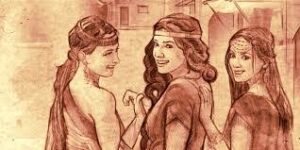The Rape of Dinah
34: 1-7
The rape of Dinah DIG: Where is Jacob’s outrage at the rape of his daughter? Why is it left to his sons to be filled with grief and fury? Why doesn’t he do something? Anything? Where is his responsibility as a parent? His spiritual leadership?
REFLECT: How do you deal with separation from the world (First John 2:15-17)? Can you be in the world, but not of the world (John 17:6-19)? What are the consequences of ignoring the world (Matthew 28:18-20)? What are the consequences of immersing yourself in the world (First Corinthians 5:1-13)? How can you find a balance between the two?

Now Dinah, the daughter Leah had borne to Jacob, went out to visit the young women of the land (34:1). This action loosened the stone that caused a landslide. Dinah was probably just a girl of fourteen to sixteen years old at the time. Jacob’s sons could keep themselves company, but Dinah needed the company of other girls her own age. So it is not surprising that she went into Shechem to find some girlfriends. This was not unreasonable, but in doing so she put herself at risk. The moral condition of Shechem was shameful. Not only was promiscuity common, but it was also part of their religious system itself. Young girls traveling alone were considered fair game at that time. Didn’t Ya’akov and Leah know this? Did they warn Dinah? Did they try to prevent her from going and she rebelled? Did Dinah feel like she could look out for herself and resented her parent’s overprotective attitude? We just don’t know. At any rate, she went and while visiting some of the girls of Shechem, she was noticed by the prince of the city.
There is much unsaid here. God had commanded Jacob to go back to Canaan. But how would his children find suitable mates? It seemed impossible to insist that they marry from their own people as Abraham and Isaac had done. And he certainly wasn’t going to send any of his children back to Laban! How could they stay totally separate from the Canaanites? How could they and their children stay morally clean in the spiritual toilet of Shechem? Was this why God wanted Jacob to take his family to Bethel and avoid these influences?
When Shechem son of Hamor the Hivite, the ruler of that Canaanite area, saw her, he grabbed her and raped her (34:2). I am sure that even as common as rape was amongst the godless Canaanites, little was denied Shechem, being the prince of the city. The word for raped is taken from the word defiled (Psalm 79:1). Defiled is used in the TaNaKh to describe a person who has contacted impurity through such things as skin diseases, bodily emissions, or touching something dead.520 So the rape of Dinah and the defilement of the Tabernacle are regarded with the same feelings and described by the same word.521
His heart was drawn to Dinah, daughter of Jacob (Hebrew: Ya’akov), and he loved her and spoke tenderly to her trying to appease his own guilt. He knew what he did was wrong. After a woman was raped in this culture, she could not expect to ever have a valid marriage. She was normally relegated to the status of an outcast, so I am sure that Shechem thought he was doing a noble thing by marrying Dinah. And Shechem said to his father Hamor, “Get me this girl as my wife” (34:3-4). He had no idea of the moral standard that he had violated or the moral line he had crossed, especially with her brothers.
Somehow this message got back to Jacob very quickly. When he heard that his daughter Dinah had been raped, his sons were in the fields with his livestock; so he kept quiet about it until they came home (34:5). But we never get the feeling that Jacob is distraught over the rape of his daughter. Later, when hearing of Joseph’s supposed death, Jacob tore his clothes, put on sackcloth and mourned for his son many days, he refused to be comforted and wept for him (37:34-35). We see none of that here. He made no attempt to send word to his sons about the tragedy. While waiting for his sons to come home, Shechem and his father Hamor went out to talk with Ya’akov about Dinah (34:6).
Word traveled fast and one way or another Jacob’s sons heard of the rape and they came in from the fields as soon as they heard what had happened. They were filled with grief and fury, because Shechem had done a disgraceful thing in Isra’el by lying with Jacob’s daughter, a thing that should not be done (34:7). The rabbis teach that people had renounced rape since the Flood. The phrase, a thing that should not be done is similar to Tamar’s pleading prior to her rape by her half brother Amnon. She said to him: Don’t my brother, don’t force me. Such a thing should not be done in Isra’el. Don’t do this wicked thing (Second Samuel 13:12). There was no nation of Isra’el at the time of the rape. Yet Moses is writing Genesis for the people of Isra’el and, thus, there must be an application to the nation. So this defilement was not only against Dinah, but against Ya’akov, her brothers and, ultimately, against the people of God.522 But Jacob was passive and showed no spiritual leadership in this situation. Perhaps if Dinah were his daughter by Rachel rather than Leah, he would have acted differently.523



Leave A Comment